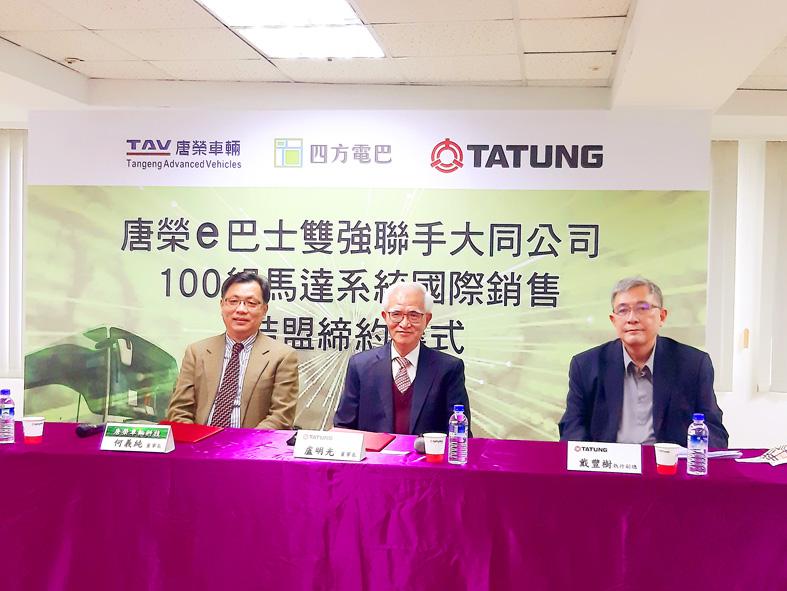Tatung Co (大同) yesterday signed a supply contract with Tangeng Advanced Vehicles Co (唐榮車輛), paving the way for the firms to deepen their partnership as they seek a share of the global electric vehicle market.
Tatung is to supply 100 high-efficiency power systems for electric buses to Tangeng, Tatung said in a statement.
The power systems include motors and driving components, it said.

Photo: CNA
The first batch of 10 power systems would be delivered for a testing project, it said.
A deal between Tatung, Tangeng and SF-eBus (四方電巴) has been struck, with a three-month project to test buses on a loop line in Tunghai University in Taichung next quarter, the statement said.
Tangeng is the nation’s biggest supplier of railway multiple units and commercial vehicles, including buses and trucks.
A successful test would lead to phase 2 of the Tatung-Tangeng partnership, as they are targeting overseas markets such as India and Thailand to promote their electric vehicle platforms under a Made in Tatung brand, the statement said.
This is the latest diversification by Tatung, which has been supplying motors for a wide range of applications over the past 70 years.
More than 46 percent of the company’s NT$35.38 billion (US$1.25 billion) in revenue in 2019 came from its electronics businesses.
Three years ago, Tatung began outlaying resources to develop electric motors and power systems in collaboration with the Industrial Technology Research Institute.
The company rolled out its first electric vehicle motor in January.
Tatung expects many business opportunities at home, as the government plans to replace 16,000 diesel-fueled buses with electric buses within 10 years, media reports said yesterday.

BYPASSING CHINA TARIFFS: In the first five months of this year, Foxconn sent US$4.4bn of iPhones to the US from India, compared with US$3.7bn in the whole of last year Nearly all the iPhones exported by Foxconn Technology Group (富士康科技集團) from India went to the US between March and last month, customs data showed, far above last year’s average of 50 percent and a clear sign of Apple Inc’s efforts to bypass high US tariffs imposed on China. The numbers, being reported by Reuters for the first time, show that Apple has realigned its India exports to almost exclusively serve the US market, when previously the devices were more widely distributed to nations including the Netherlands and the Czech Republic. During March to last month, Foxconn, known as Hon Hai Precision Industry

Taiwan Semiconductor Manufacturing Co (TSMC, 台積電) and the University of Tokyo (UTokyo) yesterday announced the launch of the TSMC-UTokyo Lab to promote advanced semiconductor research, education and talent development. The lab is TSMC’s first laboratory collaboration with a university outside Taiwan, the company said in a statement. The lab would leverage “the extensive knowledge, experience, and creativity” of both institutions, the company said. It is located in the Asano Section of UTokyo’s Hongo, Tokyo, campus and would be managed by UTokyo faculty, guided by directors from UTokyo and TSMC, the company said. TSMC began working with UTokyo in 2019, resulting in 21 research projects,

Ashton Hall’s morning routine involves dunking his head in iced Saratoga Spring Water. For the company that sells the bottled water — Hall’s brand of choice for drinking, brushing his teeth and submerging himself — that is fantastic news. “We’re so thankful to this incredible fitness influencer called Ashton Hall,” Saratoga owner Primo Brands Corp’s CEO Robbert Rietbroek said on an earnings call after Hall’s morning routine video went viral. “He really helped put our brand on the map.” Primo Brands, which was not affiliated with Hall when he made his video, is among the increasing number of companies benefiting from influencer

Quanta Computer Inc (廣達) chairman Barry Lam (林百里) yesterday expressed a downbeat view about the prospects of humanoid robots, given high manufacturing costs and a lack of target customers. Despite rising demand and high expectations for humanoid robots, high research-and-development costs and uncertain profitability remain major concerns, Lam told reporters following the company’s annual shareholders’ meeting in Taoyuan. “Since it seems a bit unworthy to use such high-cost robots to do household chores, I believe robots designed for specific purposes would be more valuable and present a better business opportunity,” Lam said Instead of investing in humanoid robots, Quanta has opted to invest